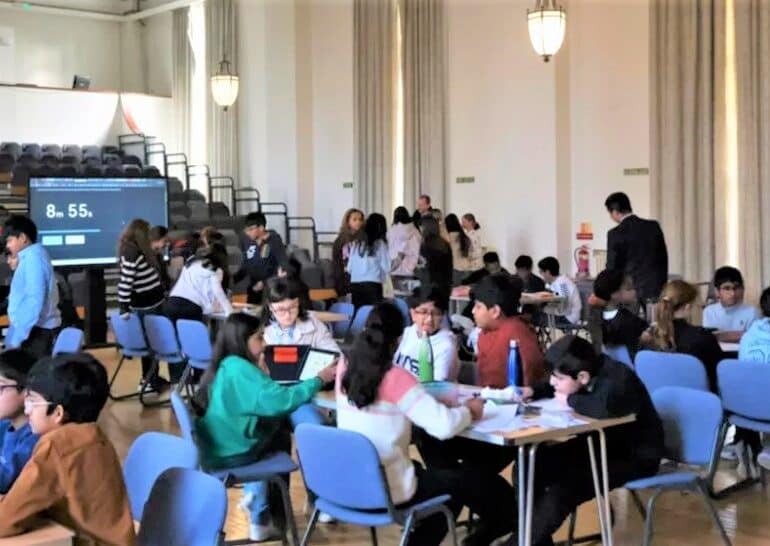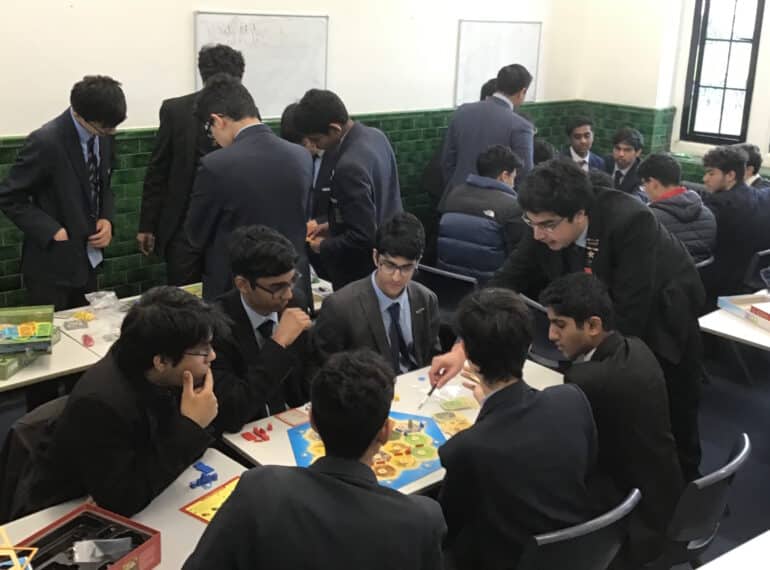
With events for all ages, QE’s Economics 450 Festival proved hugely popular with the boys.
 The festival featured academic tutorials and a lecture from Old Elizabethans, board games, a quiz, a meeting of QE’s Gresham Society for Economics and a special edition of the department’s periodical, The Econobethan.
The festival featured academic tutorials and a lecture from Old Elizabethans, board games, a quiz, a meeting of QE’s Gresham Society for Economics and a special edition of the department’s periodical, The Econobethan.
It was one of a series of innovative festivals being run by subject departments as part of QE’s new Flourish extra-curricular programme which are aimed at stimulating free-thinking scholarship among the boys. As QE celebrates its 450th anniversary, most have an anniversary theme.
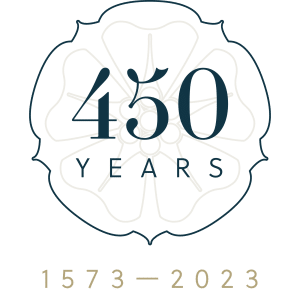 Head of Economics Shamendra Uduwawala said: “Our events had huge turnouts and the festival may be regarded as a great success. I am grateful to everyone who contributed. The boys enjoyed the board games, the quiz and our visiting speakers, while our senior students have once again raised the bar with the festival edition of The Econobethan, which includes some really spectacular work.”
Head of Economics Shamendra Uduwawala said: “Our events had huge turnouts and the festival may be regarded as a great success. I am grateful to everyone who contributed. The boys enjoyed the board games, the quiz and our visiting speakers, while our senior students have once again raised the bar with the festival edition of The Econobethan, which includes some really spectacular work.”
He also paid tribute to his Economics department colleagues, Krishna Shah, Celia Wallace, Abdoulaye Diallo and James Kane.
The festival’s biggest single event was the quiz for Years 7-11. Run in a similar style to the daily online Tradle Economics quiz, it involved boys answering questions delivered to their form groups as Microsoft Forms.
Staplyton, Underne and Harrisons’ tied for first place, with a score of 29, gaining them each 20 House points. Staplyton and Underne benefitted from particularly strong performances from Year 11, while Harrisons’ boys performed consistently across the year groups. The top form overall was 10H (Harrisons’), who scored 8 out of a possible 10 points.
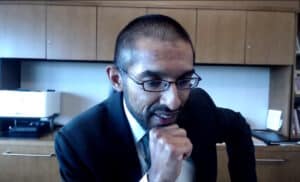 Another highlight was a talk by economist and academic Sandeep Mazumder (OE 1993–2000), who is Dean of Hankamer School of Business at Baylor University, Texas.
Another highlight was a talk by economist and academic Sandeep Mazumder (OE 1993–2000), who is Dean of Hankamer School of Business at Baylor University, Texas.
Fellow alumnus Alistair Law (OE 2013–2020), who is in his final year at the London School of Economics and Political Science (LSE), where he is reading Geography with Economics, held academic tutorials with a number of Year 12 and 13 economists.
The special session of the Gresham Society involved boys presenting articles they had written for The Econobethan PechaKucha-style – that is, 20 slides, with a maximum 20 seconds per slide.
The 450th anniversary edition of the publication itself includes articles on Economics and related subjects written by boys in Years 10 to 13, as well as an introduction by the Headmaster, Neil Enright.
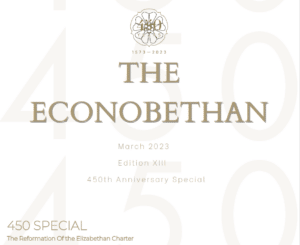 He wrote: “As my predecessor, Dr John Marincowitz (Headmaster 1999-2011), explained at this year’s Senior Awards Ceremony, when discussing his new published history of the School, the fortunes of the School have repeatedly been shaped by the political, economic and social context of the time. He emphasised that much of the interest in the development of Queen Elizabeth’s, and its multiple reinventions over the centuries, can be found in considering not just the ‘what’, but in the ‘how’ and the ‘why’.
He wrote: “As my predecessor, Dr John Marincowitz (Headmaster 1999-2011), explained at this year’s Senior Awards Ceremony, when discussing his new published history of the School, the fortunes of the School have repeatedly been shaped by the political, economic and social context of the time. He emphasised that much of the interest in the development of Queen Elizabeth’s, and its multiple reinventions over the centuries, can be found in considering not just the ‘what’, but in the ‘how’ and the ‘why’.
“These are questions and discussions that this special edition of The Econobethan takes up with great skill.”
Extending to 52 pages, the journal’s first article looks at the origins and political significance of the School’s Elizabethan Charter.
The widely varied contents also cover topics including:
- How the British Empire Used Economics to Rule the World: A Game Theoretic Analysis
- The History of Chemical Process Economics and Its Impact on the UK Economy
- What Happens When Central Banks Lose Credibility?
- Regal Ruler or Rigid System? The Pros and Cons of Monarchy Unveiled
- The Revolutionary Effectiveness of Nudge Economics
In addition, there is a Languages section, in which Year 12’s Aayush Backory gave an overview of post-World War II economic policy in Britain – Il était une fois au Royaume-Uni. In Die Geschichte von Sir Thomas Gresham, Aditya Tiwary looked at the life of the 16th-century financier and merchant, Sir Thomas Gresham, who was among the School’s supporters at its foundation in 1573. The Gresham Society is named after him.
The Econobethan was edited by the Year 12 team of Aditya, Aston Daniel, Avinash Srivastava and Nishanth Bhasuru.

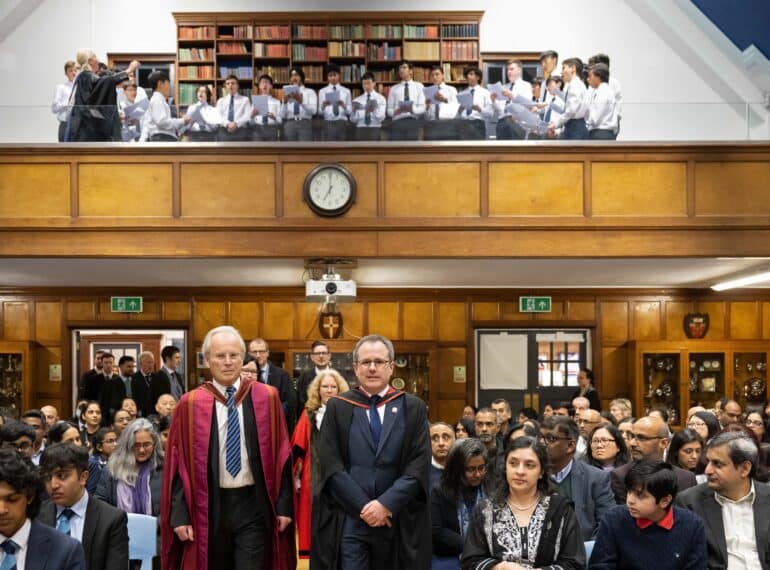
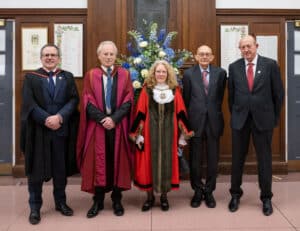 Current Headmaster Neil Enright said it was entirely appropriate that, as QE prepares to celebrate its 450th anniversary tomorrow, the place of honour should go to one of the School’s own. Dr Marincowitz was Mr Enright’s predecessor, holding the role from 1999 until his retirement in 2011.
Current Headmaster Neil Enright said it was entirely appropriate that, as QE prepares to celebrate its 450th anniversary tomorrow, the place of honour should go to one of the School’s own. Dr Marincowitz was Mr Enright’s predecessor, holding the role from 1999 until his retirement in 2011.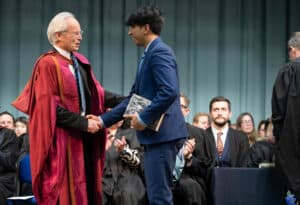 Dr Marincowitz, who first arrived at QE to join the History department in 1985, then presented prizes – which this year included copies of his book – to scores of prizewinners drawn from Years 10, 11 and 12. There were awards for all the academic subjects, for overall academic excellence, for contribution & responsibility and for outstanding performance or contribution in extra-curricular activities such as debating & public speaking, chess, drama and the Combined Cadet Force.
Dr Marincowitz, who first arrived at QE to join the History department in 1985, then presented prizes – which this year included copies of his book – to scores of prizewinners drawn from Years 10, 11 and 12. There were awards for all the academic subjects, for overall academic excellence, for contribution & responsibility and for outstanding performance or contribution in extra-curricular activities such as debating & public speaking, chess, drama and the Combined Cadet Force.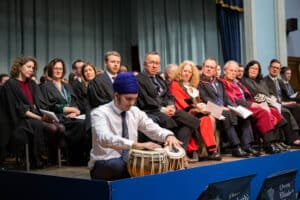 There were the customary musical interludes at the Senior Awards Ceremony, featuring performances by Music prizewinners. The interludes were: 20th-century French composer Paule Maurice’s Tableaux de Provence, performed by Year 10 saxophonist, Leo Sellis; Beethoven’s Romanze, played by violinist Jason Tao, of Year 11, and Rupak Kaida, performed by Year 12 pupil Isher Jagdev, on the tabla.
There were the customary musical interludes at the Senior Awards Ceremony, featuring performances by Music prizewinners. The interludes were: 20th-century French composer Paule Maurice’s Tableaux de Provence, performed by Year 10 saxophonist, Leo Sellis; Beethoven’s Romanze, played by violinist Jason Tao, of Year 11, and Rupak Kaida, performed by Year 12 pupil Isher Jagdev, on the tabla.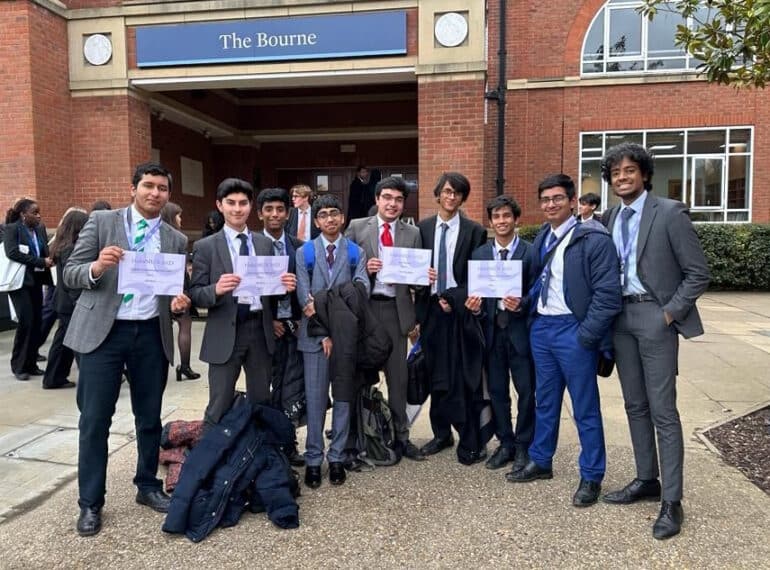
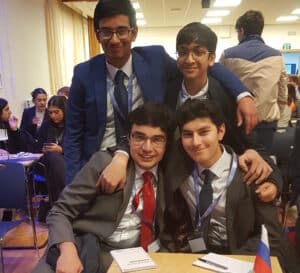 The three-day weekend ‘HabsMUN’ event, hosted by Haberdashers’ Boys’ School, saw a ten-strong QE team take on more than 500 delegates from other leading schools.
The three-day weekend ‘HabsMUN’ event, hosted by Haberdashers’ Boys’ School, saw a ten-strong QE team take on more than 500 delegates from other leading schools.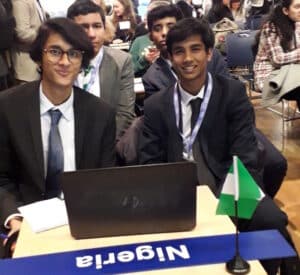 They fended off challenges from several powerful country delegations, including Habs (representing the USA), Royal Masonic School for Girls (UK) and North London Collegiate School (China).
They fended off challenges from several powerful country delegations, including Habs (representing the USA), Royal Masonic School for Girls (UK) and North London Collegiate School (China).
 Having already achieved significant successes in recent years at in-person regional, national and international Vex championships – including a world title in 2018 – QE’s robotics teams have recently added online competitions to their repertoire.
Having already achieved significant successes in recent years at in-person regional, national and international Vex championships – including a world title in 2018 – QE’s robotics teams have recently added online competitions to their repertoire.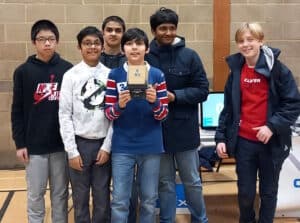 One VRC squad – team number 20785X – was named winner of both the Theme It Up! Challenge and the Community Challenge, as well as being a runner-up in the Career Readiness Challenge. Another, 20785C, took two runner-up spots.
One VRC squad – team number 20785X – was named winner of both the Theme It Up! Challenge and the Community Challenge, as well as being a runner-up in the Career Readiness Challenge. Another, 20785C, took two runner-up spots.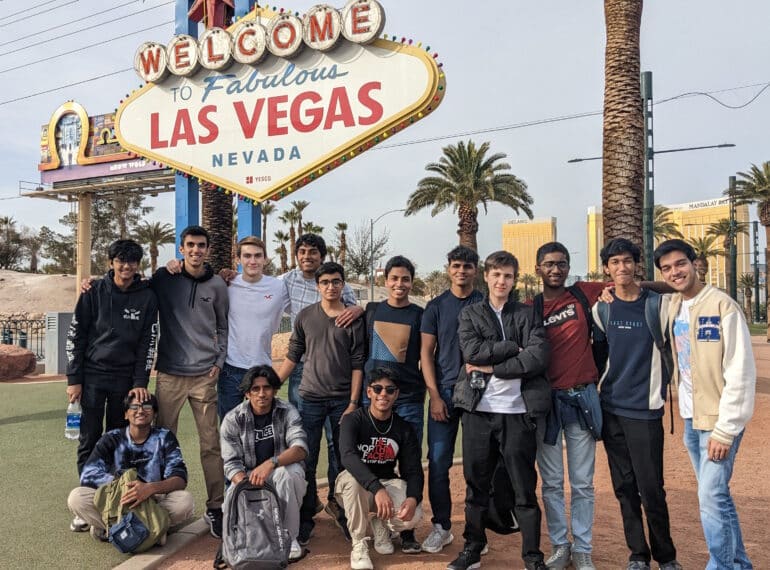
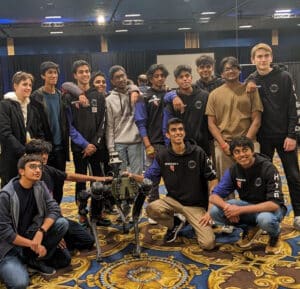 The QE boys, who made up the only teams from outside North America to attend, enjoyed both the competition and the chance to take in Las Vegas’s spectacular attractions.
The QE boys, who made up the only teams from outside North America to attend, enjoyed both the competition and the chance to take in Las Vegas’s spectacular attractions.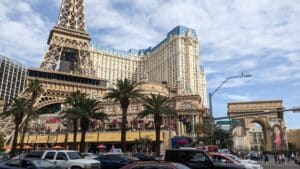 They then made their way along Vegas’s celebrated Strip. “One highlight in particular was The Venetian – a resort and hotel, which boasts an indoor network of Venice-style canals, complete with singing gondola drivers!” said Mr Noonan. Further down the street, they took in the famous Welcome to Las Vegas sign and marvelled both at the water & light show at the fountain of the Bellagio and at the incredible complexity of the part-roller coaster, part-hotel New York New York attraction. “Racking up close to 30,000 steps over the course of the day was not enough, though, as the pupils made their way to the Area 15 entertainment complex, wondering at many of the audio-visual wonders on offer, and at the surreal Omega Mart [an exhibition billed as ‘an interactive, mind-bending immersive art experience’].”
They then made their way along Vegas’s celebrated Strip. “One highlight in particular was The Venetian – a resort and hotel, which boasts an indoor network of Venice-style canals, complete with singing gondola drivers!” said Mr Noonan. Further down the street, they took in the famous Welcome to Las Vegas sign and marvelled both at the water & light show at the fountain of the Bellagio and at the incredible complexity of the part-roller coaster, part-hotel New York New York attraction. “Racking up close to 30,000 steps over the course of the day was not enough, though, as the pupils made their way to the Area 15 entertainment complex, wondering at many of the audio-visual wonders on offer, and at the surreal Omega Mart [an exhibition billed as ‘an interactive, mind-bending immersive art experience’].”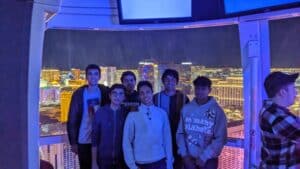 After this once-in-a-lifetime opportunity, the boys returned to their robotics, making final preparations for the following day of qualification, as well as taking part in some impromptu practice sessions. “As the only overseas team at the event, the other 100 or so US, Canada and Mexico-based teams were very eager to get to know the QE teams, with lots of potential alliance links formed,” said Mr Noonan. They topped off the day with a visit to the “incredible” High Roller observation wheel at The LINQ Hotel – a 550ft wheel offering breath-taking views over the Strip.
After this once-in-a-lifetime opportunity, the boys returned to their robotics, making final preparations for the following day of qualification, as well as taking part in some impromptu practice sessions. “As the only overseas team at the event, the other 100 or so US, Canada and Mexico-based teams were very eager to get to know the QE teams, with lots of potential alliance links formed,” said Mr Noonan. They topped off the day with a visit to the “incredible” High Roller observation wheel at The LINQ Hotel – a 550ft wheel offering breath-taking views over the Strip. After their disappointments on day 1, team HYBRID began day 2 still determined to finish in the automatic alliance spots in their division. “They succeeded in doing so, finishing the qualification section ranked 21st, and allying with team 3303S Dublin Robotics from Dublin, California,” said Mr Noonan. “They built up a great relationship with them through collaboration and discussion over the two days and were always likely to pick this team. Sadly, there was further disappointment for them, as they were cruelly denied by disqualification on a technicality in their round-of-16 game.”
After their disappointments on day 1, team HYBRID began day 2 still determined to finish in the automatic alliance spots in their division. “They succeeded in doing so, finishing the qualification section ranked 21st, and allying with team 3303S Dublin Robotics from Dublin, California,” said Mr Noonan. “They built up a great relationship with them through collaboration and discussion over the two days and were always likely to pick this team. Sadly, there was further disappointment for them, as they were cruelly denied by disqualification on a technicality in their round-of-16 game.”